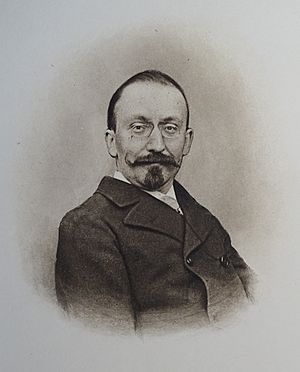Louis Couturat facts for kids
Quick facts for kids
Louis Couturat
|
|
|---|---|
 |
|
| Born | 17 January 1868 Ris-Orangis, Essonne, France
|
| Died | 3 August 1914 (aged 46) Melun, Seine-et-Marne, France
|
| Nationality | French |
| Occupation | Logician, philosopher, mathematician and linguist |
| Known for | Ido |
Louis Couturat (born January 17, 1868 – died August 3, 1914) was a smart French thinker. He was a logician (someone who studies how we reason), a mathematician (who works with numbers), a philosopher (who thinks about big questions), and a linguist (who studies languages). He is especially known for helping create Ido, a special language made for everyone to use.
Contents
Life and Education
Louis Couturat was born in Ris-Orangis, France. In 1887, when he was 19, he went to a famous school called École Normale Supérieure. There, he studied philosophy and mathematics.
Later, he taught philosophy at the University of Toulouse and the University of Caen Normandy. He was interested in transfinite numbers, which are like different 'sizes' of infinity. He also spent time in Hanover, Germany, studying the works of a famous thinker named Leibniz. In 1905, he became an assistant at the Collège de France.
Career and Ideas
Couturat was a big supporter in France of something called symbolic logic. This is a way of using symbols, like in math, to understand and solve problems in logic. It became popular before World War I. Other thinkers like Charles Sanders Peirce, Giuseppe Peano, and Bertrand Russell also worked on it.
Like Russell, Couturat believed that symbolic logic could help improve both mathematics and the way we think about math. However, another famous French mathematician, Henri Poincaré, disagreed with Couturat's ideas about symbolic logic.
Discovering Leibniz's Logic
Couturat's first important book was De Platonicis mythis (1896). In 1901, he published La Logique de Leibniz. This book was a deep study of Leibniz as a logician. Couturat based his work on many old papers that Leibniz had left behind in Hanover, Germany. These papers were called Leibniz's Nachlass.
Leibniz had died in 1716, but his papers were only properly organized in 1895. This meant that no one knew how much work Leibniz had done on logic until Couturat studied them. In 1903, Couturat published many of these papers in another big book called Opuscules et Fragments Inedits de Leibniz.
Thanks to Couturat, people realized that Leibniz was one of the greatest logicians for over 2,000 years. He was important between Aristotle and later logicians like George Boole and Augustus De Morgan. Couturat's work helped bring Leibniz's ideas back into focus in the 20th century. His work on Leibniz also led to a friendship and professional letters with Bertrand Russell.
Logic and Mathematics
In 1905, Couturat published a book called Les Principes des Mathématiques. It was about logic and the basic ideas of mathematics. It also included a section on the philosopher Kant's ideas about math. This book was first planned as a translation of Russell's Principles of Mathematics.
In the same year, he also published L'Algèbre de la logique. This book was a classic introduction to Boolean algebra. This is a type of algebra used in computer science and logic. It also covered the works of C.S. Peirce and Ernst Schröder.
Creating Ido
In 1907, Couturat helped create the constructed language Ido. A constructed language is a language that someone invents, rather than one that develops naturally. Ido was a new version of Esperanto, another constructed language. Couturat was the main supporter of Ido for the rest of his life.
He believed in creating an international language that was logical and used words from existing European languages. In this way, he was following in Leibniz's footsteps. Leibniz had also dreamed of creating a universal symbolic language. He called it the characteristica universalis.
His Death
Louis Couturat was a pacifist, meaning he believed in peace and was against war. Sadly, he died on August 3, 1914. His car was hit by another car that was carrying orders for the French Army to get ready for World War I.
He is also a character in a 2010 novel called A Curable Romantic by Joseph Skibell.
Works
- 1896: De Platonicis mythis
- 1896: De l'Infini mathématique
- 1901: La Logique de Leibniz
- 1903: Opuscules et Fragments Inédits de Leibniz
- 1903: (with Léopold Leau) Histoire de la langue universelle
- 1905. Les Principes des Mathématiques: avec un appendice sur la philosophie des mathématiques de Kant
- 1905: L'Algèbre de la logique
- 1906: ¨Pour la langue internationale
- 1907: (with Léopold Leau) Les nouvelles langues internationales
- 1910: Étude sur la dérivation dans la langue internationale
- 1910: (with Otto Jespersen, R. Lorenz, Wilhelm Ostwald and L.Pfaundler) International Language and Science: Considerations on the Introduction of an International Language into Science
- 1915: (with Louis de Beaufront) Dictionnari Français-Ido
See also
 In Spanish: Louis Couturat para niños
In Spanish: Louis Couturat para niños
 | Stephanie Wilson |
 | Charles Bolden |
 | Ronald McNair |
 | Frederick D. Gregory |

